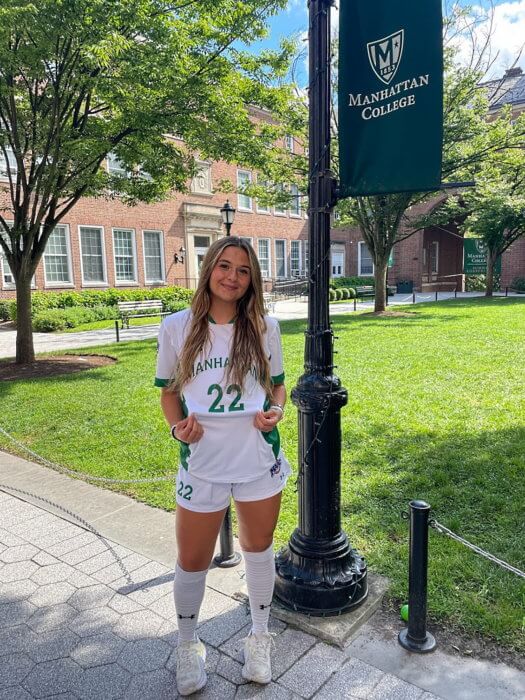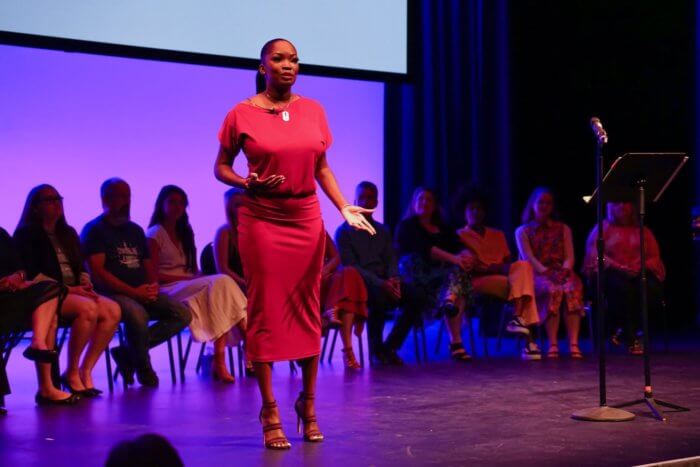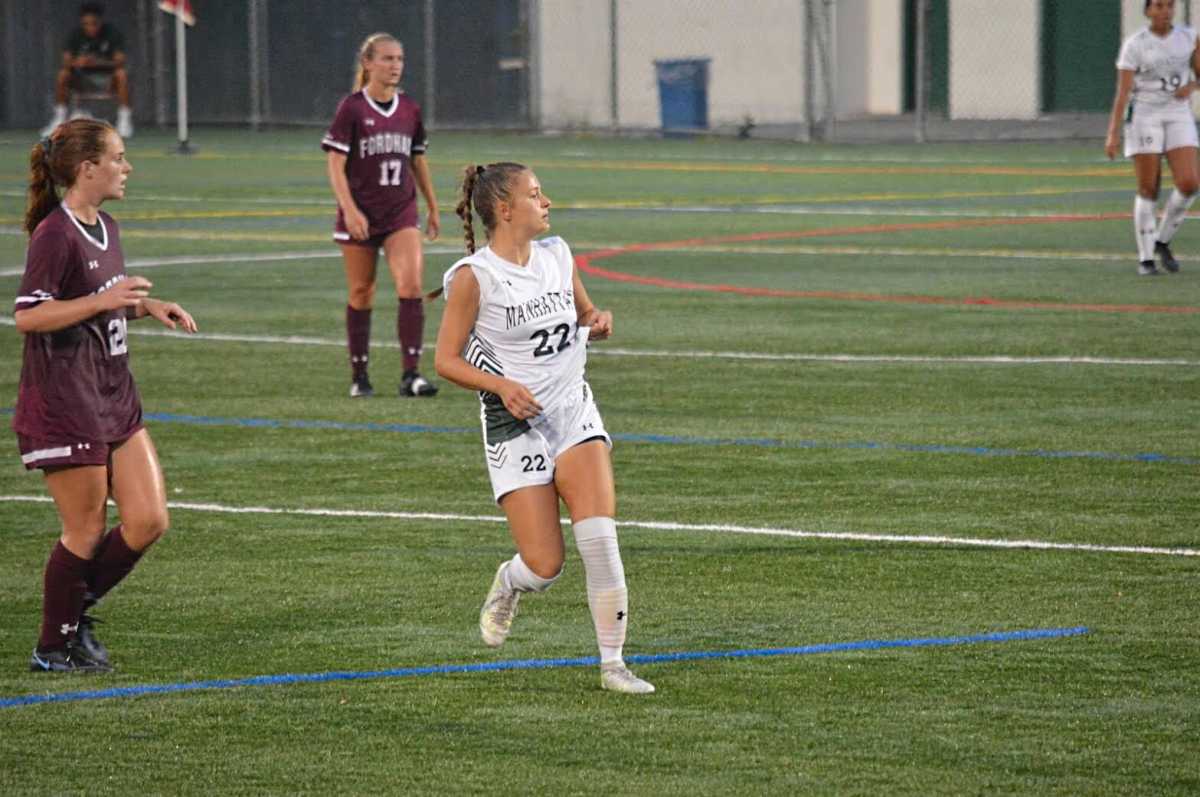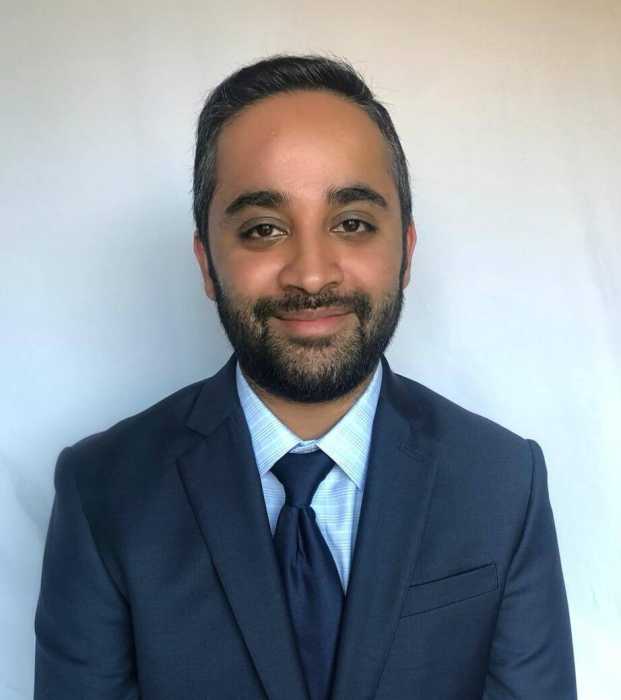Manhattan College’s midfielder Nicolette Caneda, a 19-year-old sophomore from New Hyde Park on Long Island, has never shied away from the pressure of being an on-field communicator, a crucial element of the role. Growing up with the sport since she was 4, Caneda was twice named to Newsday’s Top 100 list in while a soccer star in high school and when the 2020 pandemic hit, she sought to become even better during her senior year.
Caneda was brought in as part of Manhattan’s impressive 12-player recruiting class in 2021, and her coach Brendan Lawler noted that “hard working demeanor, vision, movement and ball-striking” in her recruiting profile.

But before Caneda could put on a green Jaspers jersey, a mental health battle threatened to upend her Division I dreams and her life.
When the pandemic put a pause on active soccer competition in March 2020, Caneda’s self-admitted competitive drive translated into intense calorie-counting — where she limited her caloric intake to 1,000 or less — and soon, an eating disorder and body dysmorphia that manifested for two years.
“I love this sport. My grandfather and father played this sport, and in a way it’s shaped the person I’ve become and who I strive to be as a player and a leader,” Caneda told the Bronx Times. “Do I feel pressured to stay in it? Sometimes. I think I put it on myself and sometimes you can lose track of what you need to do for yourself.”
An article published by The Sport Journal said COVID-19’s interruption of sports fueled a loss of identity that many NCAA athletes are feeling today subsequent to COVID-19’s impact on sport performance.
“When the pandemic came, I had all this time on my hands. No practices. No games, no results coming in, no tracking how many minutes I played,” she said. “Tracking my food intake became my new goal and I became obsessed with losing weight because it was a result, a goal to chase.”
At her unhealthiest she says, Caneda weighed 110 pounds in the summer of 2020], a stark 30-pound difference from the start of COVID that March.
“I stepped on that scale at my doctor’s appointment and I was like, ‘What the heck? When did it get this bad? When did that happen?'” she said. “It became so easy to ignore hunger cues … I kept chasing these goals and I knew if I wanted to play at college, I couldn’t at this weight or with this mindset.”
Recent studies by the National Collegiate Athletic Association (NCAA) show that collegiate student-athletes are experiencing “elevated levels of mental health concerns,” which includes “mental exhaustion, anxiety and depression” during and after the COVID-19 pandemic.
Division I athletes face vast amounts of pressure as they compete at the highest levels of their respective sports, but the connection between athletics and unhealthy eating behaviors is seen at all levels. Among Division I athletes, 10% of male athletes were at risk for anorexia 38% were at risk for developing bulimia. For Division I women student-athletes, 35% were at risk for anorexia and 58% at risk for bulimia.
This past year, at least five college athletes have died by suicide, sparking calls for more support from the NCAA, but also a broad support system of sports psychologists, mental health providers and open spaces for athletes to be vulnerable.
On Thursday, Caneda shared her two-year battle with eating disorders and body dysmorphia with the Manhattan College student body as part of a mental health initiative by This My Brave — which uses storytelling as a device — to normalize mental health discussions and vulnerability in the hyper-competitive world of college athletics.
The pilot program for This is My Brave’s College Edition launched in 2019 thanks to grant funding and the program uses storytelling as a way to start the conversations and end the stigma of mental illness among college students. Recently, the program has used these conversations as a vehicle for student-athletes to break the mold of competitive perfection.
“Athletes, especially in college settings are expected to be excellent on the field or the court and also in the classroom. So there’s this, this bar of excellence so acknowledging any sort of struggle with mental illness could disrupt that image,” said Erin Gallagher, executive director of This is My Brave. “In this space, we want to reach a point where these conversations about mental health and what they are going through are so normal, they are longer considered brave for talking about it.”

Conversations about mental health, especially in collegiate athletics is one that should have been happening “20 years ago,” sports psychologist Dr. Sam Maniar told the Bronx Times.
“When I got my PhD 20 years ago, I thought we were going to be having these conversations then and it’s taken about 20 years, so I don’t know how fast this is going to happen, but I think it’ll continue to happen,” said Maniar. “We’re in the infancy of trying to understand the mental health of these athletes both as individuals and also as a kind of a big group of people and our understanding of the brain.”
Maniar said the prolonged exposure to social media — exaltation for good games and unfortunately, hurls of abuse for bad performances — can have detrimental effects on both student-athletes’ health and performance.
Caenda told the Bronx Times she knows the title of athlete isn’t forever — especially as women see fewer athletic opportunities and lesser investment than their male counterparts — but aspires to be a voice of “heath and wellness” in the sports arena, and hopes to be a physical therapist.
Once consumed with perfection on the court, Caneda is now taking more pride of her contributions off-the-field, helping teammates and friends on campus with similar mental health battles. It’s also been the impetus for her own Instagram page that she dedicates to being a safe space for those inundated with negative body imaging and nutritional misinformation that can be prevalent on social media.
“I want my page to be a place where people can feel no judgment about their bodies, their journey and what they’re going through,” said Caneda. I thought I was the only one going through these negative feelings and emotion, and through this page … it’s been amazing connecting with others and being able to help.”
Reach Robbie Sequeira at rsequeira@schnepsmedia.com or (718) 260-4599. For more coverage, follow us on Twitter, Facebook and Instagram @bronxtimes























